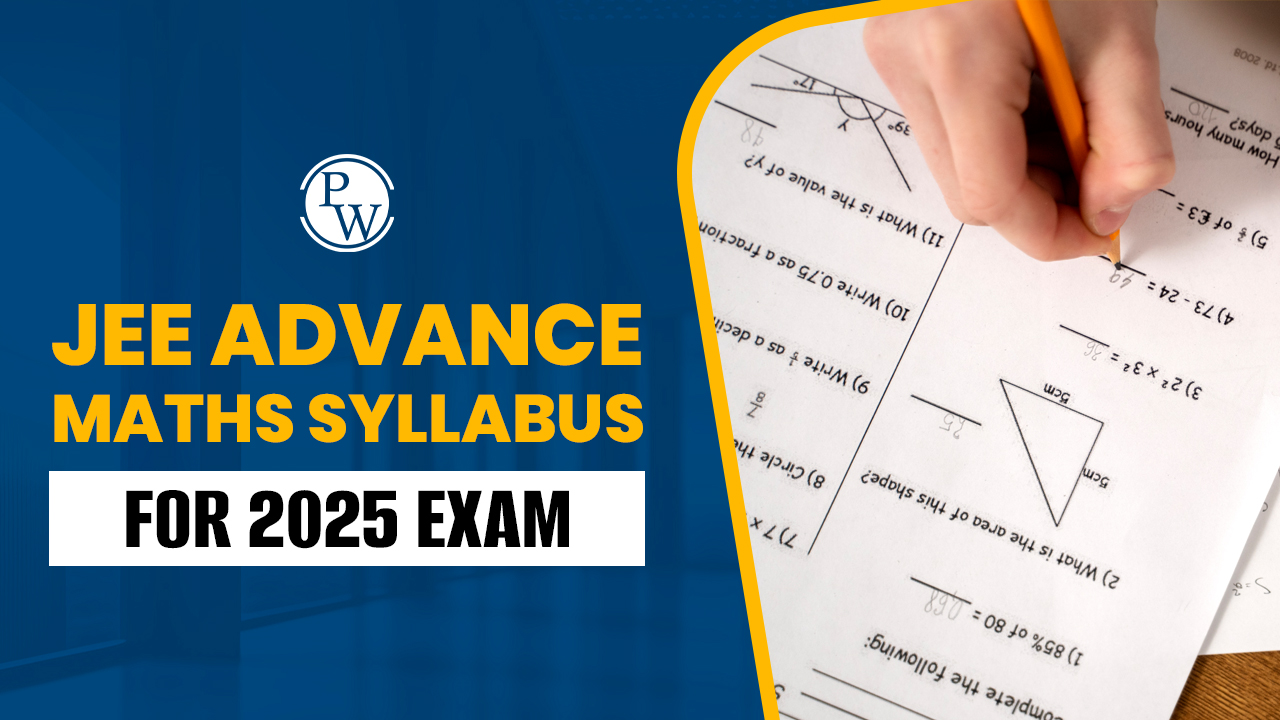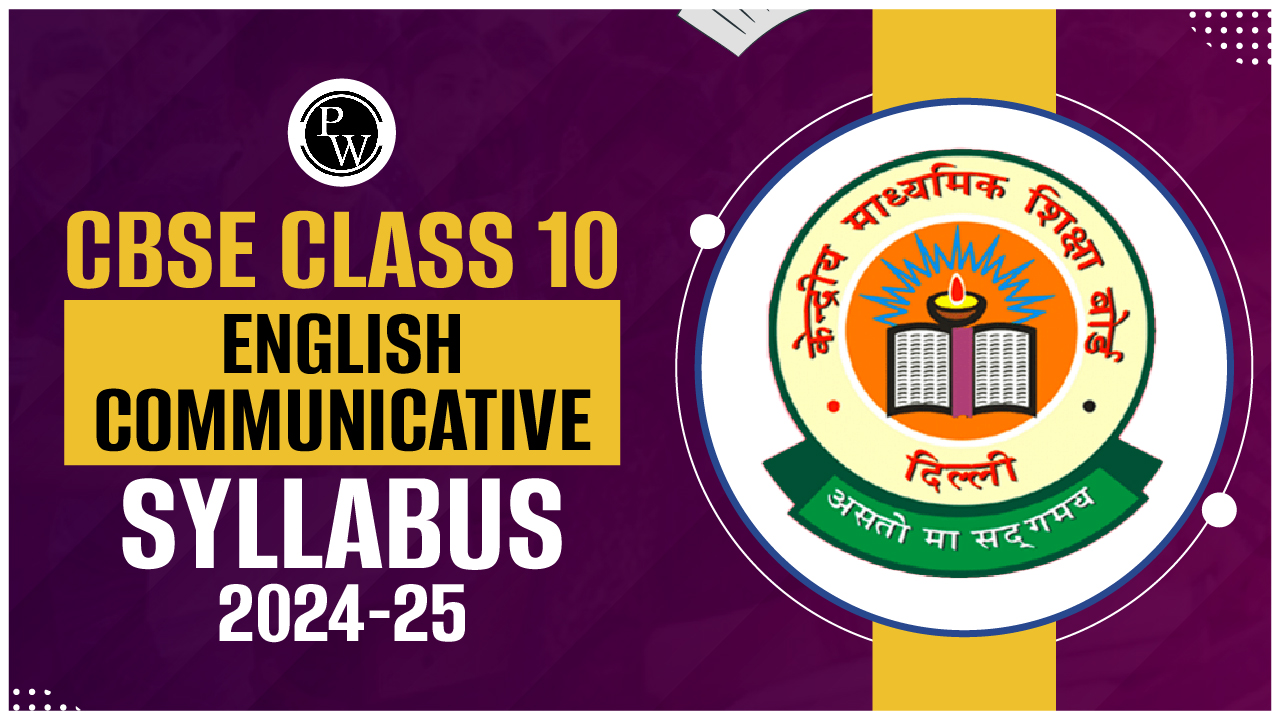JEE Advanced Maths Syllabus for 2025 Exam

If you are getting ready for the JEE Advanced 2025, you are probably feeling a mix of excitement and nervousness. After all, cracking this exam is no small feat? Because maths is so confusing. But here’s the good news: understanding the JEE Advanced Maths syllabus for 2025 is half the battle won. We will walk you through the syllabus, highlight key topics, decode weightage trends, and share tips to ace Maths, the subject that often becomes a game-changer for rankers. Whether you are just starting your preparation or looking to fine-tune your strategies to get a seat in prestigious college.
Check out - JEE Books for Preparation
JEE Advanced syllabus 2025
The JEE Advanced is notoriously difficult, particularly in mathematics.Mastering the JEE Advanced 2025 math syllabus is key to success on the exam. The syllabus is designed to cover a wide range of topics, from sets, relations, and functions to Vectors, each chosen to assess your analytical and problem-solving skills.
A clear grasp of the JEE Advance maths syllabus for 2025 helps you:
-
Create an efficient study schedule.
-
Identify areas that require extra attention.
-
Build a strong foundation in mathematical concepts.
In the following sections, we will explore every component of the JEE Advance maths syllabus for 2025 and provide insights into the study practices and materials available.
Read More - JEE Advanced 2025 Syllabus Subject-Wise Details
Detailed of the JEE Advanced maths syllabus for 2025
The JEE Advance maths syllabus for 2025 is structured to test a variety of mathematical skills. Here is an detailed look at each major topic and its subtopics:
1. Sets, Relations, and Functions
This section forms the basis of mathematical logic and is a critical part of the jee advance maths syllabus for 2025. Key areas include:
-
Sets and their representations: Understanding different types of sets—empty, finite, and infinite.
-
Algebra of sets: Operations like intersection, complement, difference, and symmetric difference, including De-Morgan’s laws.
-
Cartesian products and relations: Covering ordered pairs, domains, codomains, and the concept of equivalence relations.
-
Functions: Detailed study of various types of functions including polynomial, trigonometric, exponential, logarithmic, and more, along with their operations like sum, difference, product, and composition.
By mastering these subtopics, you can build a solid foundation as outlined in the jee advance maths syllabus for 2025.
2. Algebra
Algebra plays a pivotal role in the jee advance maths syllabus for 2025. This topic includes:
-
Complex numbers: Their algebra, polar representation, and properties such as the triangle inequality and cube roots of unity.
-
Quadratic equations: Focus on real coefficients, relations between roots and coefficients, and symmetric functions.
-
Progressions: In-depth coverage of arithmetic and geometric progressions, including finite sums and infinite series.
-
Logarithms, permutations, and combinations: Important for solving many higher-level problems, along with the binomial theorem.
A thorough revision of these concepts is indispensable for a well-rounded preparation of the jee advance maths syllabus for 2025.
Check out - JEE Question Bank
3. Matrices
Matrices are a key element in the jee advance maths syllabus for 2025. Important aspects include:
-
Basic operations: Addition, scalar multiplication, and matrix multiplication.
-
Determinants and inverses: Finding determinants of matrices up to order three, understanding elementary row and column transformations, and computing inverses.
-
Special matrices: Diagonal, symmetric, and skew-symmetric matrices, along with solving simultaneous linear equations.
Focusing on matrices will sharpen your analytical skills and is crucial for success as per the jee advance maths syllabus for 2025.
4. Probability and Statistics
The jee advance maths syllabus for 2025 also emphasizes probability and statistics to test your ability to analyze data. Key topics include:
-
Fundamental probability: Concepts of random experiments, sample spaces, and various types of events.
-
Rules and theorems: Addition and multiplication rules, conditional probability, independence of events, and Bayes’ Theorem.
-
Statistical measures: Mean, median, mode, standard deviation, and variance, both for grouped and ungrouped data.
-
Application problems: Involving permutations and combinations to calculate probabilities accurately.
Understanding these topics is vital for tackling the probability sections of the jee advance maths syllabus for 2025.
5. Trigonometry
Trigonometry is a cornerstone of the jee advance maths syllabus for 2025. This section covers:
-
Trigonometric functions: Their properties, periodicity, and graphs.
-
Identities and formulae: Addition and subtraction formulae, multiple angle formulae, and general solutions of trigonometric equations.
-
Inverse trigonometric functions: Focus on their principal values and elementary properties.
Mastering trigonometry will give you an edge in solving many complex problems in the jee advance maths syllabus for 2025.
Check out - JEE Previous Year Question Papers
6. Analytical Geometry
Analytical Geometry in the jee advance maths syllabus for 2025 is divided into two parts: two dimensions and three dimensions.
Two Dimensions:
-
Coordinate systems: Cartesian coordinates, distance formulas, and section formulas.
-
Straight lines and circles: Equations in various forms, angle calculations, and properties of circles.
-
Conic sections: Equations and properties of parabolas, ellipses, and hyperbolas.
Three Dimensions:
-
Space geometry: Distance between points, direction cosines, and ratios.
-
Lines and planes: Equations of lines in space, skew lines, and distances between them.
-
Intersection problems: Including angles between lines and planes.
A detailed study of analytical geometry as prescribed in the jee advance maths syllabus for 2025 will improve your spatial visualization and problem-solving skills.
7. Differential Calculus
Differential Calculus is another critical component of the jee advance maths syllabus for 2025. Topics include:
-
Limits and continuity: Concepts of limits at a real number, continuity of functions, and the application of L’Hospital’s Rule.
-
Derivatives: Derivative definitions, rules (sum, product, quotient, and chain rules), and derivatives of various functions such as polynomial, trigonometric, exponential, and logarithmic.
-
Applications: Tangents, normals, increasing/decreasing functions, and extreme value problems including Rolle’s theorem and Lagrange’s mean value theorem.
A deep understanding of differential calculus is essential for success as outlined in the jee advance maths syllabus for 2025.
8. Integral Calculus
Integral Calculus is integral (pun intended) to the jee advance maths syllabus for 2025. Key areas include:
-
Concept of integration: Indefinite integrals, definite integrals, and the Fundamental Theorem of Calculus.
-
Techniques of integration: Integration by parts, substitution, and partial fractions.
-
Applications: Solving problems related to areas under curves and forming ordinary differential equations.
Dedicating time to mastering integral calculus is a must if you want to tackle the challenges of the jee advance maths syllabus for 2025.
9. Vectors
Vectors are a vital topic in the jee advance maths syllabus for 2025. This section covers:
-
Vector operations: Addition, scalar multiplication, dot product, and cross product.
-
Triple products: Scalar and vector triple products and their geometric interpretations.
A solid command over vectors will not only improve your conceptual clarity but also boost your confidence in solving complex problems as per the jee advance maths syllabus for 2025.
Topic-Wise Weightage Analysis
Understanding the weightage of each topic is crucial in planning your study schedule. Here’s a quick look at the topic-wise weightage of the jee advance maths syllabus for 2025:
|
JEE Advanced 2025 Maths Topics |
Weightage (%) |
|
Complex Numbers |
6% |
|
Coordinate Geometry |
21% |
|
Circle |
8% |
|
Ellipse |
3% |
|
Parabola |
7% |
|
Straight Line |
3% |
|
Differential Calculus |
7% |
|
Application of Derivatives |
7% |
|
Fundamentals of Mathematics |
3% |
|
Integral Calculus |
21% |
|
Area under curve |
3% |
|
Definite integration |
15% |
|
Differential equation |
3% |
|
Matrix & Determinants |
10% |
|
Permutation & Combination |
3% |
|
Probability |
13% |
|
Trigonometry |
10% |
|
Inverse Trigonometric function |
3% |
|
Solution of Triangle |
3% |
|
Trigonometric Ratio & identities |
3% |
|
Vector and 3D |
7% |
|
Vector |
7% |
This table clearly illustrates which areas of the JEE advance maths syllabus for 2025 carry more weight. Focusing on topics like Coordinate Geometry and Integral Calculus and which have the highest percentages can yield significant improvements in your overall score.
Study Materials and Preparation Tips
A well-planned study plan combined with the right materials can make all the difference in mastering the JEE Advance maths syllabus for 2025. Find table below where provide some recommendations to boost your preparation:
| Book Name | Link | |
| 47 Years Chemistry Chapterwise and Topicwise Solved Papers PYQ of JEE Advanced 1978 to 2024 | Link | |
| 47 Years Mathematics Chapterwise and Topicwise Solved Papers PYQ of JEE Advanced 1978 to 2024 | Link | |
| 47 Years Physics Chapterwise and Topicwise Solved Papers PYQ of JEE Advanced 1978 to 2024 | Link | |
| SKC Physics Crush Class 12 Handwritten Format Notes By Saleem Sir For JEE | Link | |
| JEE Advanced Rankers Test Series 2025 As Per Latest Exam Pattern | Link |
1. Standard Textbooks:
Choose textbooks that cover the fundamental concepts in each topic. Books by renowned authors or NCERT Books can provide clarity and depth, ensuring that every aspect of the jee advance maths syllabus for 2025 is well understood.
2. Practice Papers and Previous Year Questions:
It is important to practice with previous year question papers and mock tests. Resources like "JEE Advanced 47 Years with JEE Main 124 Sets PYQs" and "47 Years Mathematics Chapterwise and Topicwise PYQs" can provide helpful insights into the types of questions in the JEE Advance maths syllabus for 2025.
3. Time Management and Revision:
Create a balanced study schedule that allows you to revisit topics periodically. Revision is key when dealing with a comprehensive syllabus such as the jee advance maths syllabus for 2025. Make sure to allocate extra time for topics with higher weightage like Coordinate Geometry and Integral Calculus.
4. Find right Study Groups:
Engaging with peers can help clarify doubts and provide new insights. Group studies focused on discussing challenging problems from the jee advance maths syllabus for 2025 can significantly enhance your learning experience.
Creating Your 1-Year Study Plan
For many aspirants, having a structured study plan is crucial. Here’s a simplified approach to planning your year:
-
Initial Phase:
Begin with an in-depth review of each topic in the jee advance maths syllabus for 2025. Focus on understanding fundamental concepts before moving on to complex problem-solving. -
Practice Phase:
Gradually shift your focus to solving problems and taking regular mock tests. Emphasize topics with higher weightage, and periodically assess your progress with timed practice sessions. -
Revision Phase:
As the exam nears, allocate more time for revision, especially for tricky areas. Reinforce your learning by revisiting important problems and concepts from the jee advance maths syllabus for 2025.
A consistent, right planned approach is key to mastering the content and excelling in the exam.
To master JEE Advanced maths syllabus for 2025, understanding concepts deeply and applying them creatively is crucial. The syllabus includes various topics like sets, functions, and vectors. By focusing on each topic, you can build confidence and skills to solve exam problems effectively. Success in the exam requires regular practice, thoughtful study, and clear understanding of the syllabus.
Read More - JEE Advanced 2025 Preparation with Previous Year Question Papers
FAQs
1. Which major topics are covered in the JEE Advanced Maths Syllabus 2025?
It includes Sets, Relations and Functions, Algebra, Matrices, Probability & Statistics, Trigonometry, Analytical Geometry, Differential Calculus, Integral Calculus, and Vectors.
2. What is the weightage of Coordinate Geometry in the syllabus?
Coordinate Geometry carries a weightage of 21%, making it one of the most crucial sections in the exam.
3. How many topics are there in the JEE Advanced Maths Syllabus 2025?
The syllabus covers nine major topics, each with multiple subtopics designed to test a wide range of mathematical abilities.
4. How should I structure my study plan for JEE Advanced Maths 2025?
Start by strengthening your fundamentals, gradually move to solving advanced problems, and consistently revise, focusing more on high-weightage topics.











